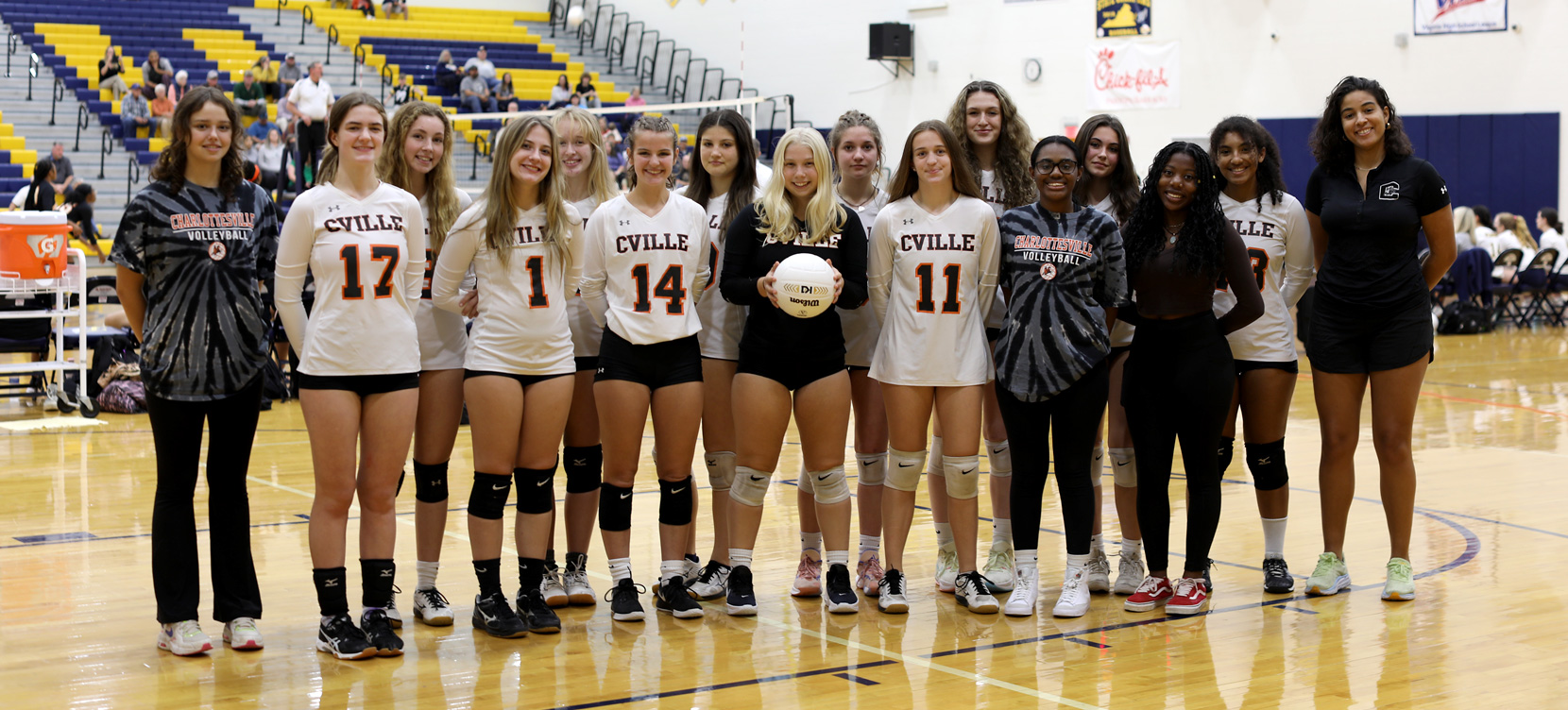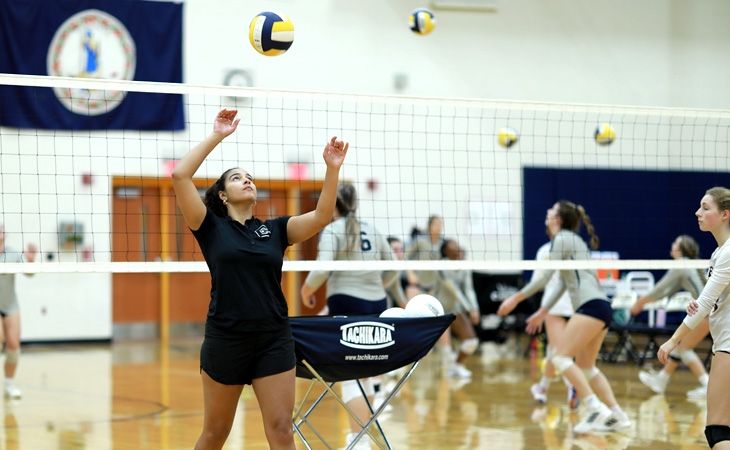With music blaring through the speakers at a high school gym on a recent fall afternoon, Marley Peters ’23 slapped a ball to her volleyball team’s setter, launching a pre-game warmup drill that would keep multiple balls in the air as the Charlottesville High School squad practiced working together as a unified machine.
The scene was a metaphor for the current state of Peters’ life. As a third-year student at the University of Virginia School of Law, she is used to juggling several tasks at once, so she didn’t hesitate to take on yet another responsibility when she accepted the role of head coach of Charlottesville’s varsity volleyball team.
Peters took over the reins midseason after serving as assistant junior varsity coach since 2021. Despite a heavy workload that includes classwork, editing duties at the Virginia Law Review and another part-time job, coaching was an easy decision for Peters. The Panama City, Florida, native has loved being on the volleyball court — whether in a gym or on the sand — since middle school.
Although volleyball was Peters’ passion, she picked up a completely different sport in college: rowing in the competitive Ivy League.
During her undergraduate studies at Dartmouth College, where she majored in English, Peters joined the women’s crew as a freshman, serving as the stroke — a position that demands strength and consistency. She went back to volleyball again during her two-year gap between graduation and law school.
Peters said she loves the feel of hitting the ball and not having to apologize for her own strength.
“I’ve been strong and athletic my whole life,” Peters said. “I take up a lot of space and I think sports has been a really good outlet for me to understand my physicality.”
As head coach, Peters was determined to pass on those lessons by helping her players understand that it is OK to be big and strong, and to embrace who they are. She said she was able to connect with players as both a coach and fellow student. If a player was upset because of a test, Peters said, she would listen and try to connect by sharing her own timely academic challenges, hoping to help them feel less alone.
“I tell them all the time that I support them, and I want them to succeed in whatever they want to do,” Peters said. “I’ll help them in any way that I can, and I hope they understand that’s a genuine offer.”
Peters has drawn many parallels between law school and coaching while discovering the kind of coach she wanted to be. Peters decided to go to law school because she wanted tools to help people. She has found that in both law school and coaching.
“You have to be able to analyze and come up with different strategies on the fly, and be like, ‘This is working, this is not working,’” Peters explained. “One thing I’ve learned through coaching is that different players need different things. One approach does not work for everyone. Realizing that required a lot of reflection.”
 Peters, pictured with the Charlottesville High School varsity volleyball team, said working with young athletes has been a highlight of her time in Charlottesville.
Peters, pictured with the Charlottesville High School varsity volleyball team, said working with young athletes has been a highlight of her time in Charlottesville.
As the team struggled to close out a losing season in October, Peters quickly discovered she needed to strike a balance between her own competitive instincts and wanting her players to have fun playing the game. She found that encouraging the girls to practice basics at home — like hitting the ball off a wall to practice serving or controlled passing — while infusing practice with music and fun helped the girls enjoy and improve at the sport.
After a couple games, Peters said, she started to feel like a full-time coach and learned to juggle her other responsibilities, which include working part-time at the library and serving as the assistant managing editor for Virginia Law Review. She also is an active Black Law Students Association member.
Game days were the busiest. And they could fall on almost any day of the week, from weekday evenings to all-day weekend tournaments.
“[Game days] would be eaten up by volleyball,” Peters said, “I would just go home and go to sleep.”
Most days this fall season, she would wake up around 6:30 a.m. and study for about an hour before heading to the gym for her own health. After classes from 9-11 a.m., she would have lunch and study until she had to be at the high school at 4 p.m. On weekdays, a 6:30 p.m. game would get her home by 9:30 p.m. at the earliest.
When the team was not competing, they were practicing after school.
“I am a pretty scheduled person, so I wake up at the same time every day,” Peters said. “I really have to be careful with my mornings, because that’s when I’m most productive.”
Besides modeling consistency and discipline, Peters also showed her players the power of community support. Once she became the head coach, her own classmates would often attend games to support her and the team.
“It wasn’t one law student, it was five, six and then at the end it was 12 law students,” said alumnus Jonathan Blank ’95, whose daughter played on the CHS team. “There is [nothing] that says a student is a leader and is special than their classmates and colleagues showing up to support them in whatever they’re doing.”
When Peters was heading into her first game as head coach, she pointed out her friends to the players.
“There are people you guys might not even know [who] are showing up and want you to have fun,” she told them.
Genesis Moore ’23 was one of Peters’ many supporters. Once Peters stepped up as head coach, Moore took on a “team mom” role by bringing snacks to support the players.
“It was another family for BLSA students,” Moore said. “We knew the players, some of the parents, and felt very invested in the team.”
Peters’ work with the team left parents like Blank impressed.
“She’s an extraordinary person who stepped up to lead. I think that’s important for the Law School because we teach our students to lead,” Blank said. “She’s a leader, and the parents and the students felt it.”
After graduation in May, Peters plans to join WilmerHale in Washington, D.C., to work with emerging companies and venture capital. As she moves on from UVA, Peters said she hopes to coach volleyball in some capacity in the future.
“Working with young athletes has been the highlight of my time in Charlottesville,” Peters said. “I love supporting them in whatever way they want to be supported.”

Founded in 1819, the University of Virginia School of Law is the second-oldest continuously operating law school in the nation. Consistently ranked among the top law schools, Virginia is a world-renowned training ground for distinguished lawyers and public servants, instilling in them a commitment to leadership, integrity and community service.


